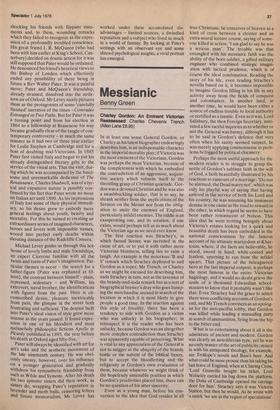Messianic
Benny Green
Charley Gordon: An Eminent Victorian Reassessed Charles Chevenix Trench (Allen Lane £8.95) In at least one sense General Gordon, or Charley as his latest biographer endearingly describes him, is an indispensable character in the imperial morality play; if Victoria was the most eminent of the Victorians, Gordon was perhaps the most Victorian, because of the completeness with which he embodied the contradiction of an aggressive, acquisitive society which submits itself to the throttling grasp of Christian quietude. Gordon was a devoted Christian and he was also a swashbuckling soldier, that is to say, he shrank neither from the implications of the Sermon on the Mount nor from the obligation to smite the enemies of England, particularly infidel enemies. The riddle is an exasperating one, and its solution, if one exists, would perhaps tell us as much about the Victorian age as we need ever know.
The first reaction was Strachey's, in which factual licence was recruited in the cause of art, or to put it with rather more Victorian bluntness, telling lies to raise a laugh. An example is the notorious 'B and S' remark which Strachey deployed to nail Gordon as a toper; Mr Trench, or Charley as we might be excused for describing him, nails Strachey in turn, not as the inventor of the brandy-and-soda remark but as a sort of biographical brewer's dray who goes humping the merchandise around in search of the location in which it is most likely to give people a good time. In the reaction against this style of frivolity, there has been a tendency to side with Gordon as a victim who was unlucky in his biographer; in retrospect it is the reader who has been unlucky, because Gordon was an altogether more complex contradiction than Strachey was apparently capable of perceiving. What is vital to any appreciation of the General is not to snigger at the ubiquity of the brandy bottle or the naiveté of the biblical frenzy, but to accept the bloodletting and the religiosity at Gordon's own evaluation of them, because whatever we might think of the hopelessly untenable position in which Gordon's proclivities placed him, there can be no question of his utter sincerity.
Even as a young man, before his conversion to the idea that God resides in all true Christians, he conceives of heaven as a kind of cross between a cloister and an extra-mural lecture course, saying of someone killed in action, 'I am glad to say he was a serious man'. The trouble was that entangled with his messianic faith was the ability of the born soldier, a gifted military engineer who combined strategic imagination with tactical prudence, which is of course the ideal combination. Reading the story of his life, even reading Strachey's novella based on it, it becomes impossible to imagine Gordon filling in his life in any activity away from the fields of conquest and colonisation. In another land, in another time, he would have been either a source of endless trouble to local authority or certified as a lunatic. Even as it was, Lord Salisbury, the then Foreign Secretary, instituted a few tactful inquiries as to whether or not the General was barmy, although it has to be said in Gordon's defence that very often when his sanity seemed suspect, he was merely applying commonsense to problems befogged by political chicanery.
Perhaps the most useful approach for the modern reader is to struggle to grasp the nettle of Gordon's sublime faith in the will of God, a faith beautifully illustrated by his reactions to rumours of a marriage: `Do not be alarmed; the Dead marry not', which was only his playful way of saying that having entered in the service of both his Lord and his country, he was assuming his imminent demise in one cause as the road to reward in the other, in which regard he seems to have been rather reminiscent of Nelson. This idea that he went trotting benignly about Victoria's estates looking for a quick and beautiful death has been embedded in the national consciousness by the famous account of his ultimate martyrdom at Khartoum, where, if the facts are believable, he stood, sword in hand, white-coated and fearless, spurning to run from the infidel spears. That picture of the beleaguered hero at the last imperial outpost, is perhaps the most famous in the entire Victorian hagiology, and it would no doubt grieve the souls of a thousand Edwardian schoolmasters to know that it probably wasn't like that. Even Strachey had the grace to admit there were conflicting accounts of Gordon's end, and Mr Trench convinces as an apologist for the anti-pacifist lobby, that Gordon was killed while leading a marauding party in search of ammunition, firing from the hip to the bitter end.
What is so entertaining about it all is the admixture of ancient and modern. Gordon was clearly an antediluvian type, yet he was an early master of the art of publicity; mixed in with his antiquated theology, for example, are Trollope's novels and Bass's beer. And what could be more prosaic than his taking his last leave of England, when at Charing Cross, 'Lord Granville bought his ticket, Lord Wolseley carried his bag down the platform, the Duke of Cambridge opened the carriage door for him'. Strachey says it was Victoria Station, but then he would. As he wrote with ' a smirk 'we are in the region of speculations'.






































 Previous page
Previous page